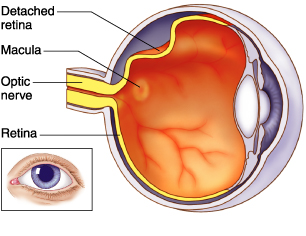
If you follow football or sports in general, you may have heard the news that the Minnesota Vikings head coach Mike Zimmer recently missed a game with his team due to emergency eye surgery to repair a detached retina. In fact, he had multiple procedures done during the month of November to repair his retina and is still undergoing recovery from these surgeries. Due to the risk of permanent vision loss and blindness, a retinal detachment can be a serious condition, and close attention and care should be given to the signs and symptoms to receive immediate care.
Can anyone get a detached retina? The risk of a retinal detachment in a normal, healthy individual is very rare; risk factors for a retinal detachment include high myopia or nearsightedness, family history of retinal detachment, previous history of retinal detachment, thinning of the retina called lattice degeneration, and previous eye surgery such as cataract or glaucoma surgery.
So what should you look out for? Symptoms of a retinal tear consist of flashes of light or floaters in your vision. These symptoms occur due to changes in the jelly of the eye called the vitreous. As you get older, the gelatinous vitreous become more liquefied and separates itself from the retina. During this process, it can induce a retinal tear and creating flashes and floaters. This retinal tear can proceed to a retinal detachment if fluid collects under the retinal tear and pulls the retina off its wall. Individuals with a retinal detachment may see the appearance of a curtain or veil blocking part of their vision or sudden painless loss of vision.
If you experience any of these symptoms, you should immediately seek care from an eyecare provider. During the exam, your eyes will be dilated to look for the presence of a retinal tear or detachment. If you are diagnosed with a retinal tear or detachment, you will need treatment in the form of a laser procedure and possibly surgery. This often requires consultation with a retina specialist.
So if you experience any of the afore-mentioned symptoms, the most important step you can take is to be seen as early as possible by an eyecare provider to ensure proper diagnosis and subsequent management.
Make an appointment today at one of our eight convenient locations.
Schedule an Appointment Online
Or call 678-381-2020